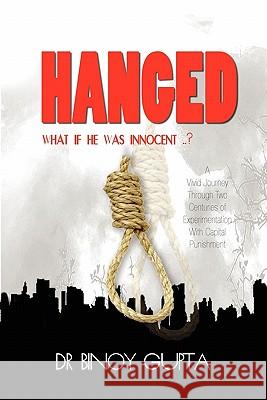Hanged: What If He Was Innocent? » książka
Hanged: What If He Was Innocent?
ISBN-13: 9781419681837 / Angielski / Miękka / 2009 / 216 str.
This book is a serious study of capital punishment in the form of an fictionalised trial before the Supreme Court of India of a person who has been sentenced to death by the lower courts. The book examines the history and law of capital punishment in several countries of the world, including USA, UK, Canada, Australia, and India. The views of the European Union which has totally abolished capital punishment, the stand of the United Nations, and the birth and maturity of the Amnesty International have all been discussed. Unfortunately, some countries, including USA, Japan and India, have still retained capital punishment in their laws. Law is fallible. In spite of all our modern advances, innocent persons have been, and continue to be convicted and executed. This book gives a number of cases of proven miscarriage of justice. Apart from the fallibility of humans at all levels, the very concept of executing (killing) a man is repulsive and can not find a place in any modern legal system. The decision to abolish capital punishment has, of course, to be taken by the government, the executive arm of the government. But where this does not happen, the ultimate decision rests with the judiciary. Under the guise of interpreting laws, judges are always making new laws. The law is not static, but dynamic. It is the role of the judges to keep pace with the time and tide and make the law what it should be. There are judges who are abolitionists. I reproduce the words of Hon'ble Justice V. R. Krishna Iyer, a former Judge of the Supreme Court of India. "I am an abolitionist because my compassionate heart beats to the nuances of Mahatma Gandhi's and his Ahimsa. He has said that God has given life and God alone can take it. Therefore, life-depriving processes of homicide by hanging or otherwise under judicial command cannot be justified to violation to the sacred preservation of life. Death sentence runs the risk of innocent persons being executed. In my judgment in the Supreme Court, I was against death sentence and Lord Scarman, sitting in the Privy Coucil, appreciated my judgments on the subject, followed them in his judgment (though in a minority). In 1977, the Amnesty International held an International Conference against death penalty and invited me, then a judge of the Supreme Court of India, to inaugurate it along with Prime Minister Olaf Palme, Sweden's Prime Minister. The venue was Stockholm. " I wholly agree with the theme of the author of the book "Hanged, What if he was innocent" that Capital punishment should be abolished as guiltless people may suffer execution by judicial error. The narration by the author of an innocent youth being hanged and his innocence discovered a day later in vain is not uncommon. What a terrible crime? I take the liberty of reproducing an actual instance from a book by Justice A.S.P. Ayyar "25 Years a Civilian" " The Sub-Collector's bungalow was a big and spacious one, but had no compound walls and was situated in the same compound as the District Judge's Bungalow and the District Medical Officer's Bungalow. One room in the even bigger District Judge's Bungalow was not used, the reason assigned being that a previous District Judge had committed suicide there. He had sentenced a man to death for murder, though the man had protested that he was at Chicacole, miles away from the scene of murder, at the time he was alleged to have committed the murder, and thus could never have committed the murder. The sentence was confirmed by the High Court and the man duly hanged. Some time after that, the man's spirit is said to have appeared before the District Judge in his sleep at 2 a.m. at night and told him, "It is you who have committed the murder and not I. If you go and look up the records in the Chicacole Sub-Collector' office, you would find that in a mahazar I have been noted as having been present there that day. The conscientious District Judge, an Englishman, took his car and went t











